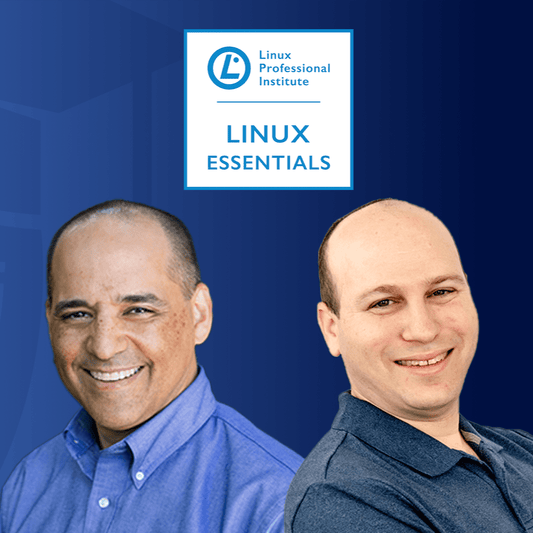Linux Courses
Mastering Linux is one of the smartest moves you can make when launching or advancing your IT career. This powerful open-source framework drives everything from enterprise servers to cybersecurity defenses, making Linux expertise one of the most valuable assets in today’s tech world.
-
CompTIA Linux+ (XK0-005) Complete Course, Labs, & Practice Exams
Vendor:CompTIARegular price $315.00 USDRegular priceUnit price / per$0.00 USDSale price $315.00 USD -
LPI® Linux Essentials (010-160) Complete Course & Practice Exams
Vendor:LPIRegular price $69.00 USDRegular priceUnit price / per
Master Linux Fundamentals To Jumpstart Your It Career
Mastering Linux fundamentals opens the door to various opportunities for IT professionals looking to build practical, job-ready skills. Linux powers much of today’s cybersecurity infrastructure, cloud computing platforms, and IT service management systems, making it one of the most in-demand skills across tech industries. When you understand Linux, you're not just learning a single operating system–you're building a flexible skill set that fuels innovation and adaptability across countless roles.
Key Topics Covered In The LPI Linux Essentials Certification
The LPI Linux Essentials certification is designed to ensure you're ready to succeed in modern IT environments that rely on Linux systems. If you're pursuing a Linux course online to launch your tech career, this certification covers areas hiring managers value. As you work through our Linux online training, you'll develop the foundation to thrive in system administration, cybersecurity, and cloud support roles. Here’s what you’ll focus on as you prepare:
- The Linux Community and Open Source Careers: Explore the open-source movement, Linux’s role in tech innovation, and how open-source skills connect to real-world career paths.
- Navigating a Linux System Confidently: Build the ability to move through file systems, manage directories, and execute fundamental commands that streamline day-to-day operations.
- Mastering the Linux Command Line: Develop confidence using the shell to manipulate files, automate tasks, manage processes, and troubleshoot systems efficiently.
- Digging into Linux System Architecture: Learn how Linux manages hardware, memory, and processes behind the scenes—essential knowledge for optimization and troubleshooting.
- Securing Systems Through File Permissions and User Management: Master how to secure Linux environments by setting file permissions, managing users and groups, and applying critical system protections.
Career Paths You Can Unlock With A Linux Certification
Earning your LPI Linux Essentials certification signals to employers that you have the technical skills to work with real Linux systems in fast-paced business environments. Here’s how a Linux certification can help you step into new roles:
- Linux System Administrator: System administrators are responsible for maintaining, configuring, and troubleshooting enterprise-level Linux systems. Certification proves you can manage user accounts, configure security settings, monitor performance, and keep services running smoothly.
- Network Engineer: Many networking environments rely on Linux-based servers and routers. As a network engineer, you’ll apply your Linux knowledge to configure firewalls, maintain secure networks, and troubleshoot network services critical to business operations.
- Cybersecurity Analyst: Linux is at the core of many cybersecurity tools and platforms. Certified professionals use Linux to conduct penetration testing, monitor system logs for threats, and implement secure configurations that protect organizational data.
- DevOps Engineer: DevOps professionals often work within Linux environments to automate infrastructure, deploy applications, and manage cloud resources. Knowledge of shell scripting, permissions, and networking basics helps streamline operations and supports continuous integration/continuous delivery (CI/CD) pipelines.
- Technical Support Specialist: Many tech support roles, especially those supporting enterprise software or web hosting, require Linux troubleshooting skills. Certification gives you the foundation to assist with server issues, permission errors, and basic network diagnostics.
- Cloud Support Associate: As companies migrate services to cloud platforms, cloud support associates with Linux skills are increasingly valuable. You might help maintain Linux servers within AWS, Azure, or private cloud environments, supporting storage solutions, databases, and virtual machines.

How To Prepare For The CompTIA Linux+ Exam And Succeed
If you're preparing for the CompTIA Linux+ certification, Dion Training’s comprehensive course is designed to equip you with the hands-on skills and deep understanding needed to pass the exam—and thrive in real-world IT environments. Here’s how to make the most of your preparation:
- Structure Your Study Sessions: Break down your study schedule into core topics like system architecture, GNU and Unix commands, user and group management, and security configurations. This targeted approach ensures you build knowledge in manageable chunks.
- Practice in a Real Linux Environment: Set up a virtual lab using a popular Linux distro such as Ubuntu or CentOS. This allows you to get hands-on experience with the command line, shell scripting, and system administration tasks—skills you’ll need both on the exam and the job.
- Master the Exam Format with Practice Tests: Dion Training’s Practice Exam App helps you gauge your readiness with unlimited, randomized tests that simulate real exam conditions. These not only highlight areas needing improvement but also build familiarity with how CompTIA frames its questions.
- Engage with the Linux Community: Connect with others preparing for Linux+ by joining online forums, study groups, or subreddit communities. You’ll gain valuable tips, troubleshooting help, and encouragement from peers and professionals alike.
- Focus on Official Objectives: The CompTIA Linux+ exam outline is your ultimate guide. Make sure you’re covering all exam domains—whether it’s managing software, configuring hardware settings, or securing a Linux system.
- Reinforce Learning with Labs: Apply what you’ve studied through practical exercises like managing users and permissions, scheduling jobs with cron, or writing scripts to automate tasks. These hands-on labs are embedded in the Dion Training course to help you move from theory to practice.
- Build Consistency, Not Cramming: Instead of last-minute studying, focus on skill-building over time. Regular, practical engagement with Linux—like configuring a firewall or troubleshooting boot issues—will boost both your confidence and your competence.
With the right tools, a solid plan, and Dion Training’s expert instruction, you’ll be well on your way to earning your CompTIA Linux+ certification.
Why Earning A Linux Certification Boosts Your It Career
Adding a Linux certification to your resume can open career doors you might not have considered yet. From cloud platforms to cybersecurity tools, Linux powers a huge portion of the modern digital world. Therefore, if you're aiming to sharpen your tech skills or take your career to the next level, earning a certification through Linux online training could be the smartest move you make.
1. Unlock New Career Opportunities
Linux skills are in high demand across industries like technology, healthcare, finance, and government. Certified professionals are often first in line for managing servers, securing networks, and maintaining critical infrastructure. Whether you want to work as a system administrator, network engineer, DevOps specialist, or cloud technician, having Linux credentials gives you a strong advantage.
2. Build Practical, Job-Ready Skills
A Linux course doesn't just teach theory—it prepares you to handle real-world challenges. From configuring servers to troubleshooting system errors, mastering Linux fundamentals means you're ready to jump into hands-on roles that require technical agility and problem-solving skills.
3. Increase Your Earning Potential
Employers recognize that certifications signal dedication, technical knowledge, and real-world competency. That’s why Linux-certified professionals often command higher salaries. In fact, Linux experts earn an average salary of $103,000 per year, solid proof that investing in your skills pays off. Completing the LPI Linux Essentials certification can position you to negotiate better offers and confidently pursue roles that reward your expertise.
4. Gain Global Career Mobility
Linux certifications are recognized worldwide, making it easier to compete for remote positions or jobs abroad. Companies across the globe trust Linux-trained professionals to manage their most critical systems, which gives you greater flexibility in where and how you build your career.
5. Join A Supportive, Global Community
When you earn a Linux certification, you’re stepping into one of the most active tech communities out there. This global network provides access to forums, mentorship opportunities, and ongoing learning resources. Staying engaged with the Linux community keeps your skills sharp and opens the door to future growth.
How Dion Training Helps You Earn Your Linux Certification
When you're serious about earning your LPI Linux Essentials certification, you need a course that gives you more than surface-level information. Dion Training is built around clear lessons, real-world labs, and a support system that gets you exam-ready and career-ready at the same time.
Linux Courses Designed To Fit Your Schedule And Build Real Skills
- Focused lessons that respect your time: Dion Training's Linux online courses break down the Linux Essentials curriculum into short, powerful lessons. Instead of getting lost in endless theory, you work through 7+ hours of expert-led video training across 95 targeted lessons.
- Quizzes and practice exams that keep you on track: You’ll reinforce your knowledge through 12 quizzes and over 200 practice exam questions that mirror the real LPI® Linux Essentials test.
- Full access for a full year: Every Linux Essentials course comes with 12 months of access. You can revisit lessons whenever you need a refresher, whether you're studying for your exam or brushing up once you're working inside a Linux environment.
Real Labs That Help You Practice, Not Just Memorize
- Learn by doing with built-in labs: Watching videos alone won't prepare you for real-world Linux jobs. Dion Training’s course includes structured labs that walk you through important system tasks. You’ll practice setting user permissions, navigating file systems, managing processes, and working from the command line.
- Build true confidence, not just test-taking skills: By working through real scenarios, you’ll build muscle memory that carries over to the exam and the workplace. Labs help you turn textbook knowledge into hands-on ability, setting you apart from candidates who only studied theory.
Why Students Choose Dion Training For Linux Certification
- Real-world experience where it matters most: Dion Training’s instructors bring years of practical Linux knowledge to their lessons. You’re learning from people who have built systems, solved problems, and trained teams, not just taught theory from a book.
- A 60-Day Pass Guarantee that backs you up: We’re confident in the training we deliver. If you complete the course and still don’t pass your LPI® Linux Essentials exam, we’ll cover the cost of your retake.
- Recognition you can trust: Dion Training is proud to be an LPI Platinum Partner, giving you peace of mind that you're learning from a certified and trusted organization.
Read also:
Frequently Asked Questions
Are there any prerequisites for taking a Linux course?
At Dion Training, our Linux courses are designed with accessibility in mind, catering to both beginners and experienced IT professionals alike. While no specific prerequisites are required, a basic understanding of computer operations will enhance your learning experience.
What support resources are available for Linux course students?
We prioritize student success, providing an array of support resources, including expert guidance through support@diontraining.com. Our courses also feature a community-driven learning approach, with active participation on IT forums and online discussions to facilitate peer support and engagement.
Do employers value Linux certifications?
Absolutely. Linux certifications are highly regarded across the IT industry, reflecting your expertise in open-source environments. Employers recognize these credentials as a testament to your capability to manage and operate within Linux-based systems.
What topics are covered in a Linux course?
Our comprehensive Linux courses cover essential topics such as system administration, network management, security protocols, and more. Designed to fulfill real-world demands, the curriculum is structured to develop your skills and prepare you for industry certification exams.
How long does a typical Linux course last?
The duration of our Linux courses varies, depending on the level of depth and focus. Typically, our bite-sized learning modules are curated to maximize retention, allowing you to complete most courses at your own pace while balancing your personal and professional life.
Is hands-on experience included in Linux courses?
Yes, hands-on experience is a crucial component of our Linux courses. We emphasize practical application to ensure you gain the necessary skills to apply your knowledge in real-world scenarios, enhancing your technical proficiency and confidence in the workplace.


